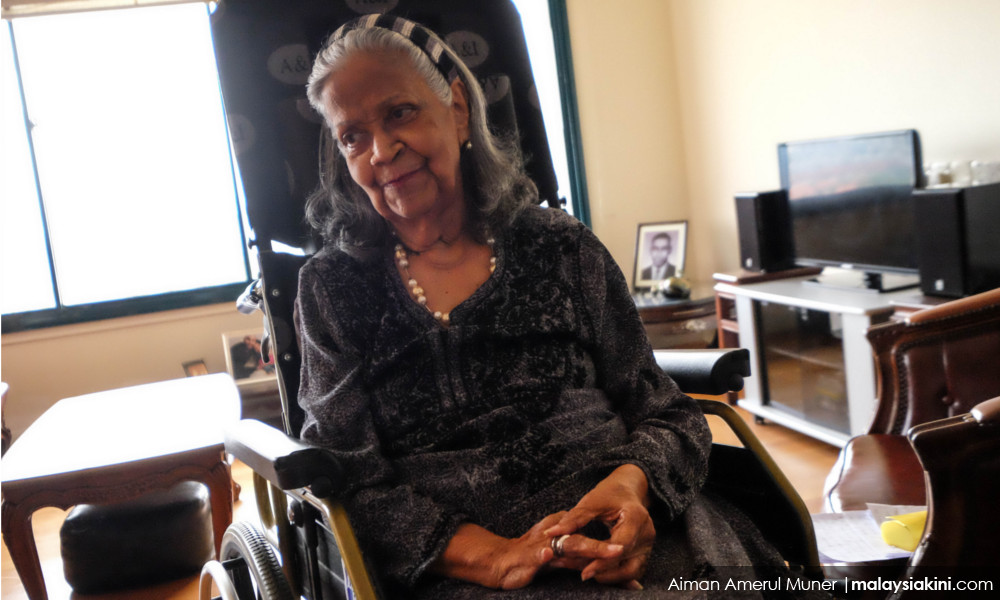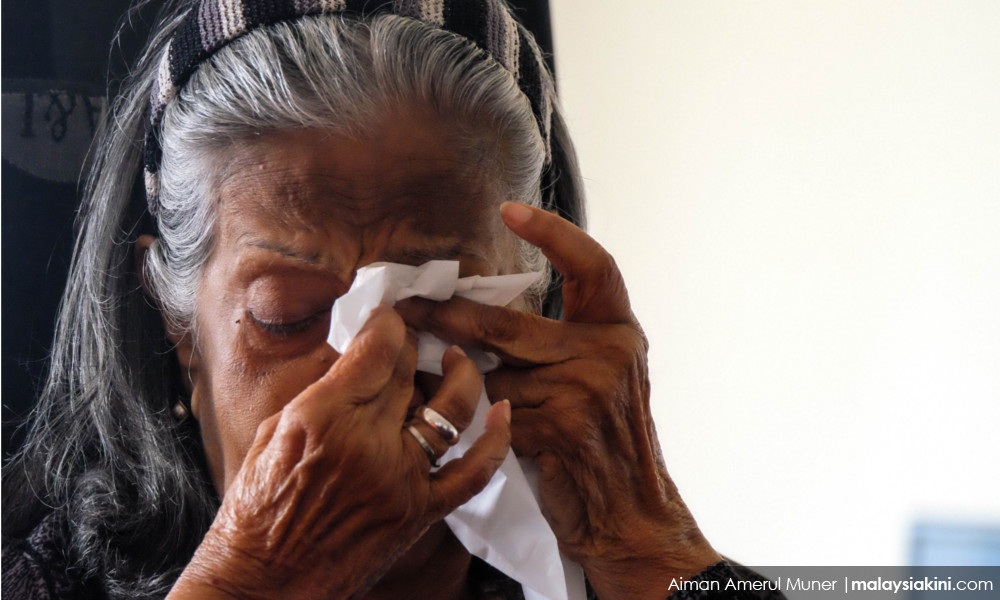MALAYSIANSKINI | Rasammah Bhupalan, who turned 90 in May this year, keeps a neat house with plenty of natural light, an amazing view of the Istana Negara from the living room windows and framed photographs of her family everywhere you look.
Her family has clearly been a huge influence in her life, in which she has been a freedom fighter, social rights activist and dedicated teacher.
At 16, Rasammah joined the Rani of Jhansi Regiment, the women’s wing of the Indian National Army (INA) after attending a rally in her hometown of Ipoh to hear INA leader Subhas Chandra Bose’s speech.
Two years later, she returned home and eventually became a teacher, a decision influenced by the fact that she came from a family of teachers who were active in unions. In 1960, she formed the Women Teachers’ Union (WTU).
 She also served as a teacher in many schools such as Methodist Girls’ School in Ipoh and Penang, later becoming a principal and administrator at Methodist Girls’ School Klang and Methodist College in Kuala Lumpur.
She also served as a teacher in many schools such as Methodist Girls’ School in Ipoh and Penang, later becoming a principal and administrator at Methodist Girls’ School Klang and Methodist College in Kuala Lumpur.
She was also very active in the National Council of Women’s Organisations and the Young Women’s Christian Association (YWCA), the latter of which she remains an elected member today.
But from the way she speaks, it is clear she holds a lot of pride for what WTU achieved in her time.
For ten years after its inception, WTU fought for equal wages for women teachers in the country, and in 1970 its dream became a reality.
The pioneer in the fight for gender equality in Malaysia said WTU was the first of its kind “to cut across” all differences such as language and academic qualifications.
“The only thing that you had to be was to be a woman and a teacher. This (sort of) unity had never been reached before.
“We were convinced that this fight for equality would permeate into every other section of government, wherever women were employed, from the lowest to the highest,” she said in an interview with Malaysiakini at her residence in Damansara Heights on Thursday.
However, she said, none of this would have been possible without the father of the nation, Tunku Abdul Rahman.
“He, more than any other politician or prime minister, has made such an impact on my life and I do believe on the lives of people in the nation.
“His life was dedicated to Malaysia and all our people.
“He cut across economic positions. He made it a policy to establish a state which would give an honoured place, faithfully, to all its people, regardless of race, religion and economic status.
“He is still the greatest prime minister Malaysia has had,” she said, pausing in between her words as her eyes filled up with tears as she recalled Tunku.
“Any study of the history of unions and in particular of WTU must take note that it was Tunku who stood steadfastly and set up government machinery to interact on this question of women’s equal rights and equal pay,” she added.
 She elaborates on meeting Tunku in their fight for equal pay for women in her contribution to “Dialog: Thoughts on Tunku’s Timeless Thinking,” a 270-page compilation of anecdotes and essays by Malaysians about the country’s first prime minister.
She elaborates on meeting Tunku in their fight for equal pay for women in her contribution to “Dialog: Thoughts on Tunku’s Timeless Thinking,” a 270-page compilation of anecdotes and essays by Malaysians about the country’s first prime minister.
Here, in her own words, Rasammah talks about Tunku and how he influenced not only her but also the nation:
IF YOU LOOK AT THE LIVES OF ALL OF US, there is one thing that you will notice as far as Tunku is concerned; that from the time he was the leader, he has always been concerned with those who did not have the opportunities of education.
He enjoyed many simple things and for me, this was a great aspect of (him as) a leader.
TUNKU PLACED AN AGENDA which had never been placed before in the history of our country on women.
This unity (in WTU) had never been reached before and who was it that gave us so much strength and so much attention? None other than Tunku. He was the only person (to do so).
AT ANY TIME I APPROACHED HIM ON ANY MATTER, particularly on equal pay, there was never a flippant manner and absolutely in no gesture did he not give attention.
Also when the repetition of appeals were made for equal pay, (it was) at all times met with understanding (from Tunku) and I would depart happy and in the knowledge that this prime minister would do justice for women even as he has done for Malaysia.
I REMEMBER VERY VIVIDLY a meeting he had with (the late Communist Party of Malaya leader) Chin Peng and (Singapore’s first chief minister) David Marshall and Tunku, even at that early time, there was a dignity in the exchange of words, in the statements he made which could not offend.
He was firm, determined, he knew what was going to be the line that Malaysia should take, but he did not belittle Chin Peng. This is an outstanding characteristic about Tunku.
IN TUNKU’S CASE, his character was such that he placed importance always on the interest of not only our people and our country, but those who would be in future opposition (to Malaysia).
We look at Tunku and we recognise that, we hope that his premiership, leadership will be implemented in the lives of our leaders today and for the future.
AFTER MAY 13, 1969, WHEN THE CONFLAGRATION AND RACIAL RIOTS ERUPTED, Tunku made a statement which I feel firmly testified to the kind of leader he was.
He was grief-ridden and there was no finger-pointing at anybody, or any group, but I recollect what he said, on this occasion of May 13:
“Kuala Lumpur was a city on fire. I could see the conflagrations from my residence at the top of the hill and it was a sight that I never thought I would see in my lifetime. In fact, all my work to make Malaysia a happy and peaceful country through these years, and also my dream of being the happiest prime minister in the world, were also going up in flames.”
I AM SINGULARLY PROUD (to say) I have been greatly influenced by Tunku’s life and contributions.
From Merdeka Day to Malaysia Day, MalaysiansKini features personalities known to Tunku, as well as their memories about him. Their detailed recollections are featured in the book "Dialog: Thoughts on Tunku’s Timeless Thinking."
MALAYSIANSKINI is a series on Malaysians you should know.
Previously featured:
War has no victors, says last surviving WWII vet
The one-man Malay literature archive
The last of generations of storytellers

